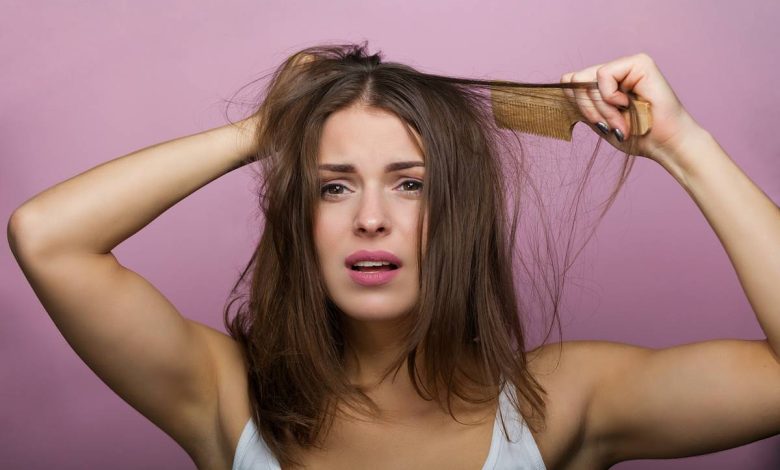Dry hair: What's it, causes, symptoms, diagnostics, treatment, prevention

Dry hair; Hair – dry
Dry hair: causes, symptoms, Diagnosis and Treatment
Dry hair can be annoying and cause a lot of anxiety., but the understanding, what causes them and how to deal with them, can help solve the problem. Dry hair can be caused by a number of factors., from environment to medical products, which we use.
What is dry hair?
Dry hair is hair, which are brittle and lack luster due to lack of moisture. It usually has a dull, rough look, and it can be hard to deal with. It can also be prone to breakage. Dry hair is a very common problem., but when they start to interfere with the natural shine and texture of the hair, this could be cause for concern.
Causes of dry hair
Environmental Factors:
- Dry climate and lack of humidity
- Exposure to cold and windy weather.
- Excessive exposure to the sun.
health conditions:
- Iron deficiency
- Seborrheic dermatitis (dandruff)
- Psoriasis
- Fungal infections (stryhuschyy shingles)
- Low activity of the parathyroid glands ( gipoparatireoz )
- Insufficient activity of the thyroid gland ( gipotireoz )
- Other hormonal disorders
- Menkes curly hair syndrome
Products:
- Excessive use of styling products.
- Coarse hair care
- Excessive hair washing and drying with a hair dryer.
Dry hair symptoms
The main sign of dry hair is the appearance and texture of the hair.. They may appear brittle., dull and rough to the touch, and may also be prone to breakage. Besides, dry hair can lead to excess dandruff, which can make maintenance and styling difficult.
When to contact a healthcare professional
If your hair is excessively dry and you cannot determine the cause, best to see a doctor. Besides, it is important to consult a professional, if your hair is extremely prone to breakage, if it is accompanied by other symptoms or if it is accompanied by other skin conditions.
Questions, that your doctor may ask
When you visit your doctor for dry hair, he can ask you the following questions:
- When did you first notice, do you have dry hair?
- Are there any environmental reasons, that you had to take into account?
- Do you have other symptoms?
- Do you use any hair care products?
- What medications do you take?
- Are you exposed to any known allergens or irritants?
- Do you have other skin conditions?
Diagnosis of dry hair
To diagnose dry hair, your doctor will start with a physical exam and discuss your symptoms. He can also order lab tests, such as blood tests, to detect any underlying diseases. Besides, he can take a small sample of your scalp, to check for infections or irritants.
Dry hair treatment
Treatment for dry hair will depend on the cause., but common treatments include:
Medicines:
- Antihistamines to reduce itching.
- Oral antibiotics for skin infections
- Corticosteroids for scalp disorders
Topical treatment:
- Shampoos, containing zinc pyrithione, selenium sulfide or ketoconazole.
- Anti-inflammatory and antifungal creams or ointments (for the scalp)
Lifestyle changes:
- Avoid overuse of hair products.
- Reducing exposure to extreme weather.
- Limiting shampooing to once or twice a week.
In case of severe damage to the hair, a haircut may be required.. Besides, some people may benefit from using a humidifier at home, to fill hair with moisture.
Dry hair home treatment
There are several home remedies for dry hair., including:
- Masking with natural oils. Applying natural oils to hair, like coconut, argan or olive oil, Helps nourish and moisturize strands.
- Apple vinegar. Diluting apple cider vinegar with water and using it as a rinse can help restore hair's natural pH balance..
- Aloe vera. Applying a blend of aloe vera and honey will help hydrate and protect your hair..
- Eggs. Applying protein-rich eggs to your hair will help strengthen it and restore moisture..
It's important to know, that none of these treatments should be used as a substitute for medical advice or treatment.
Prevention of dry hair
Preventing dry hair is just as easy, how to take some preventive measures. These include:
- Avoid overuse of hair products.
- Avoid aggressive treatments, such as chemical relaxants, bleaching and perm.
- Using heat protectants for hot styling.
- Limiting Exposure to Extreme Weather Conditions.
- Washing and conditioning hair only when needed
- Using a Humidifier in a Dry Climate.
- Talk to your doctor, if you experience other accompanying symptoms.
By following these simple steps, you will help keep your hair healthy and well-groomed.
Conclusion
Dry hair can be annoying, but understanding the cause and taking preventive measures can help solve the problem. Most causes of dry hair can be treated, just by changing your lifestyle, using appropriate products and procedures, as well as following certain home remedies. But, if you cannot determine the cause or if you have any other accompanying symptoms, it is important to consult a doctor for further diagnosis and treatment.
Used sources and literature
American Academy of Dermatology website. Tips for healthy hair. www.aad.org/public/everyday-care/hair-scalp-care/hair/healthy-hair-tips. Accessed March 01, 2021.
Ball JW, Dains I, Flynn YES, Solomon BS, Stewart RW. Skin, hair, and nails. In: Ball JW, Dains I, Flynn YES, Solomon BS, Stewart RW, eds. Seidel’s Guide to Physical Examination. 9th ed. St Louis, MO: Elsevier; 2019:chap 9.
Dinulos JGH. Hair diseases. In: Dinulos JGH, ed. Habif’s Clinical Dermatology. 7th ed. Philadelphia, PA: Elsevier; 2021:chap 24.
